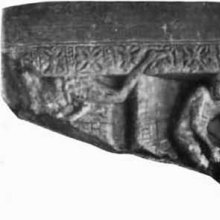Matanga Jataka, Mātaṅga-jātaka: 1 definition
Introduction:
Matanga Jataka means something in Buddhism, Pali. If you want to know the exact meaning, history, etymology or English translation of this term then check out the descriptions on this page. Add your comment or reference to a book if you want to contribute to this summary article.
Images (photo gallery)
In Buddhism
Theravada (major branch of Buddhism)
Source: Pali Kanon: Pali Proper NamesThe Bodhisatta was once born in a Candala village outside Benares and was named Matanga. One day, when Ditthamangalika, the daughter of a rich merchant, was on her way to the park with a group of friends, she saw Matanga coming towards the city, and thinking the sight inauspicious, washed her eyes with perfumed water and turned back home. Her companions, annoyed at being deprived of their fun, beat Matanga and left him senseless. On recovering consciousness, he determined to get Ditthamangalika as wife and lay down outside her fathers house refusing to move. Seven days he lay thus until her relations, fearing the ignominy of having a candala die at their door, gave Ditthamangalika to him as wife.
Knowing her pride to be quelled by this act, Matanga decided to bring her great honour. He, therefore, retired into the forest and in seven days, won supernatural power. On his return he told her to proclaim abroad that her husband was not a candala but Mahabrahma, and that seven days later, on the night of the full moon, he would come to her, breaking through the moons disk. She did as he said and so it happened. The people thenceforth honoured her as a goddess; the water in which she washed her feet was used for the coronation of kings, and in one single day she received eighteen crores from those who were allowed the privilege of saluting her. Matanga touched her navel with his thumb, and, knowing that she had conceived a son, admonished her to be vigilant and returned to the moon.
The son was born in the pavilion, which the people had constructed for the use of Ditthamangalika, and was therefore called Mandavya,. At the age of sixteen he knew all the Vedas and fed sixteen thousand brahmins daily. On a feast day Matanga came to him, thinking to turn him from his wrong doctrines, but Mandavya failed to recognize him and had him cast out by his servants, Bhandakucchi, Upajjhaya, and Upajotiya. The gods of the city thereupon grew angry and twisted the necks of Mandavya and all the brahmins so that their eyes looked over their shoulders. When Ditthamangalika heard of this she sought Matanga, who had left his footsteps so that she might know where he was. He asked her to sprinkle on the brahmins water in which were dissolved the leavings of his food; to Mandavya himself was given some of the food. On recovering and seeing the plight of the brahmins, he realized his error. The brahmins recovered, but were shunned by their colleagues; they left the country and went to live in the kingdom of Mejjha.
On the bank of the Vettavati lived a brahmin called Jatimanta, very proud of his birth. Matanga went thither to humble the pride of Jatimanta and lived higher up stream. One day he nibbled a tooth stick and threw it into the river, where, lower down, it got entangled in Jatimantas hair. He was greatly annoyed and went up stream,
Theravāda is a major branch of Buddhism having the the Pali canon (tipitaka) as their canonical literature, which includes the vinaya-pitaka (monastic rules), the sutta-pitaka (Buddhist sermons) and the abhidhamma-pitaka (philosophy and psychology).
See also (Relevant definitions)
Partial matches: Jataka, Matanga.
Full-text: Ditthamangalika, Vettavati, Mandavya, Vetravati, Matanga, Udena.
Relevant text
Search found 3 books and stories containing Matanga Jataka, Mātaṅga-jātaka; (plurals include: Matanga Jatakas, jātakas). You can also click to the full overview containing English textual excerpts. Below are direct links for the most relevant articles:
Amaravati Art in the Context of Andhra Archaeology (by Sreyashi Ray chowdhuri)
Mātaṅga Jātaka < [Chapter 3 - Amarāvatī and the Formative Stage of the Buddhist Art]
The Jataka tales [English], Volume 1-6 (by Robert Chalmers)
The Great Chronicle of Buddhas (by Ven. Mingun Sayadaw)
(8) Eighth Pāramī: The Perfection of Resolution (adhiṭṭhāna-pāramī) < [Chapter 6 - On Pāramitā]
